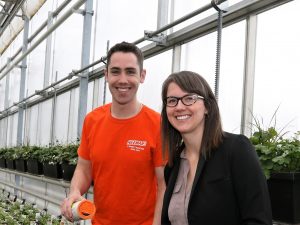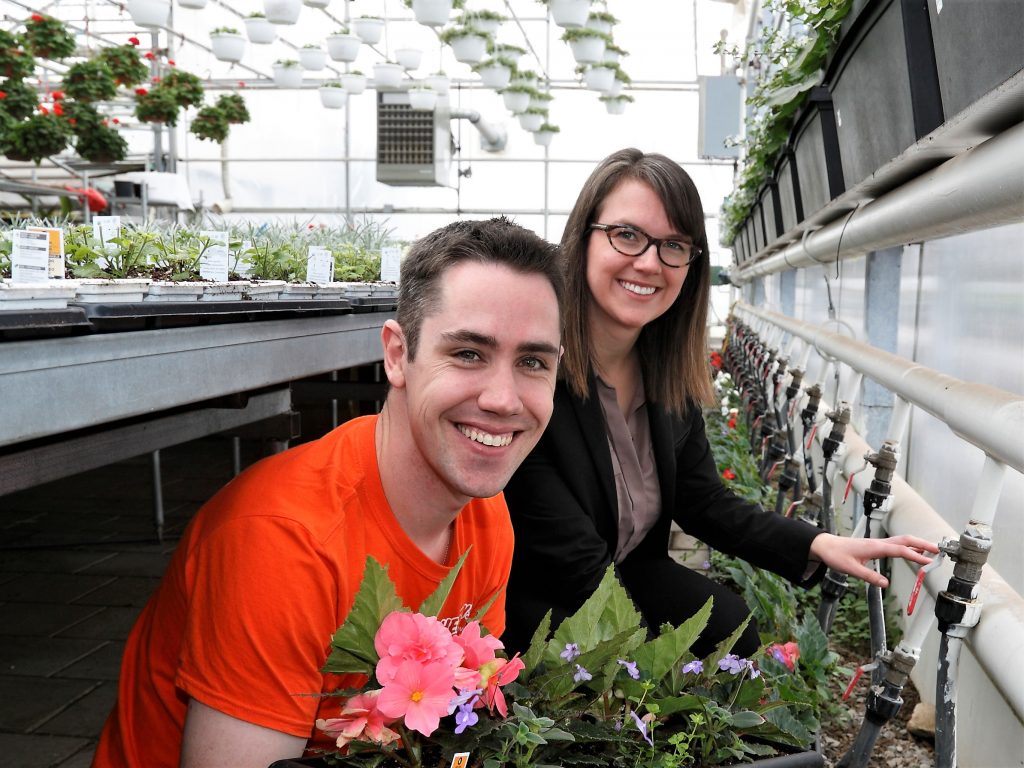A Hub of Green Activity
As more and more organizations focus on eco practices and sustainability, a membership-based program steps up to lend a helping hand
Photo: Will Heeman of Heeman’s Garden Centre & Strawberry Farm and Skylar Franke of the London Environmental Network
WHEN IT COMES to sustainability and eco-friendly business practices, there are always improvements to be made, even in places you might not expect them—like on a strawberry farm.
“As a smaller business, as a family business, we don’t necessarily have a department or a person who is 100 per cent dedicated to our environmental and sustainability practices,” explains Will Heeman, chief daymaker at Heeman’s Garden Centre & Strawberry Farm.
And that’s where a new business organization in London comes in. Launched in mid-May, The Green Economy Hub is hoping to take some of the legwork out of meeting sustainability targets for small- and medium-sized businesses.
Skylar Franke, the executive director of the London Environmental Network and manager of the London hub, says that it’s a bit like a green Chamber of Commerce for local businesses wanting to make a public pledge to improve their sustainability practices—and want a bit of help making those pledges a reality.
“There’s always more you can do. It’s like eating an elephant—you gotta do it one bite at a time” —Will Heeman
“I think the coolest part about it is that it’s voluntary, and businesses are super keen to join,” says Franke. “It exists outside of any political realm. It’s both policy and practice.”
The London hub is the seventh of its kind in Canada, with others in cities like Waterloo, Kingston, Hamilton and Ottawa.
So far, 12 local organizations, including The Root Cellar, Alchemy Junk and the City of London, have signed up to participate. Participating businesses will now work on setting up a sustainability target or project and, as a condition of membership, will have three years to work towards that target.
London’s hub is a bit different from the others in that it is focusing on three aspects of sustainability: water use, waste and energy use.
“That’s the thing I think is most impactful and unique about the London hub,” says Heeman. “They’ve specifically tackled greenhouse gas, but this one is going to be the first to tackle not only greenhouse gas but waste and water use [as well.]”

The concept that undergirds the Green Economy Hub is that making sustainable changes is, in the long-run, good for business. By publicly setting a sustainability target as part of the Hub network, there’s a bit of social pressure to meet it.
Heeman points out that one of the key aspects of the program is that it marries the moral obligation to recognize the threat of climate change for what it is, and the financial obligations of running a small business, where margins are tight.
“The appeal is, as someone who lives on the planet, you have a vested interest in working to make this an inhabitable place that future generations can enjoy,” says Heeman. “In general, doing things that are right for the environment are going to be right for the bottom line as well.”
Franke hopes to grow this program from 12 businesses now to over 25 in a year, and that by then 10 to 15 of them are already working towards their targets. And she hopes that it resonates with the London business community. “These kinds of programs work well in communities that have a sense of identity,” she says.
Heeman’s, for their part, wants to invest in machinery that will help them reuse their plastic containers by cleaning them, and to look at reducing their water use even further than they already have.
Even for businesses that have sustainability in their DNA, Heeman says there’s more to be done. “Anyone who says they can’t do more is a great fit for organizations like this because there’s always more you can do,” he says. “It’s like eating an elephant—you gotta do it one bite at a time.” ![]() Kieran Delamont
Kieran Delamont

